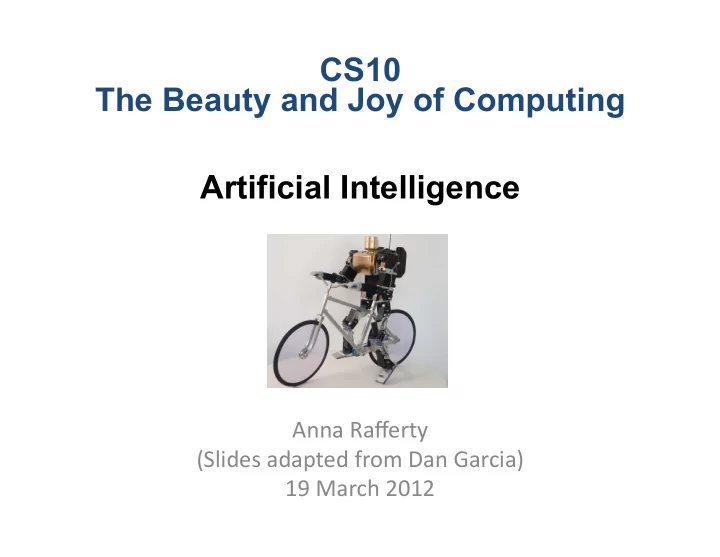

CS10 The Beauty and Joy of Computing Artificial Intelligence Anna$Rafferty$ (Slides$adapted$from$Dan$Garcia)$ 19$March$2012$
Lecture$Overview$ • DefiniEon$ • Some$AI$history$ • Tour$of$areas$of$AI$ • Turing$Test$and$the$ Chinese$room$
AI$DefiniEon$by$John$McCarthy$ • “GeMng$a$computer$to$ do$things$which,$when$ done$by$people,$are$ said$to$involve$ intelligence”$ • Finesses$the$idea$of$ whether$a$computer$ has$consciousness,$ whether$they$have$ rights,$etc$
A$liQle$history…$ • Early$AI$(1956Vearly$1970s):$symbolic$reasoning$and$ lots$of$opEmism$ • Neural$nets$(but$very$simple)$ Person: PICK UP A BIG RED BLOCK. " Computer: OK. (does it) " Person: GRASP THE PYRAMID. " Computer: I DON'T UNDERSTAND WHICH PYRAMID YOU MEAN. " Person: FIND A BLOCK WHICH IS TALLER THAN THE ONE YOU ARE HOLDING AND PUT IT INTO THE BOX. " Computer: BY "IT", I ASSUME YOU MEAN THE BLOCK WHICH IS TALLER THAN THE ONE I AM HOLDING. " Computer: OK. (does it) " http://hci.stanford.edu/winograd/shrdlu/
Revival$of$AI$ • Probability$and$ uncertainty$ • Rather$than$trying$to$ specify$a$dog$exactly,$ what$is$the$probability$ that$the$thing$we’re$ seeing$is$a$dog?$
Revival$of$AI$ • Neural$nets$with$layers$(lots$of$local$computaEons,$ like$your$brain)$
Revival$of$AI$ • Neural$nets$with$layers$(lots$of$local$computaEons,$ like$your$brain)$
What$intelligent$things$do$people$do?$ • Planning$ • (Machine)$Learning$ • Natural$Language$ Processing$ • MoEon$and$ manipulaEon$ • PercepEon$ • CreaEvity$ • General$Intelligence$ en.wikipedia.org/wiki/Artificial_intelligence
Tour$of$AI$ApplicaEons$ • QuesEons$to$keep$in$ mind:$$ – How$would$you$evaluate$ how$well$a$machine$ performed$on$the$tasks$ we$talk$about?$$ – Where$would$you$draw$ the$line$between$ intelligent/not$intelligent$ behavior?$
Planning$(from$Video$Games$lecture)$ • Range$of$intelligence$ – Low:$simple$heurisEcs$ – Medium:$pathfinding$ – High:$Learns$from$player$ • Dynamic$difficulty$ – Must$hold$interest$$ – “Simple$to$learn,$difficult$ to$master$is$the$holy$grail$ of$game$design.”$ – Adjust$to$player’s$skill$ www.businessweek.com/innovate/content/aug2008/id20080820_123140.htm en.wikipedia.org/wiki/Dynamic_game_difficulty_balancing en.wikipedia.org/wiki/Game_artificial_intelligence queue.acm.org/detail.cfm?id=971593
Machine$Learning$ • “A$program$learns$if,$aher$ an$experience,$it$ performs$beQer”$ • Algorithm$Types$ – Supervised$learning$ • Give$a$system$input$&$ output$training$data,$and$it$ produces$a$classifier$ – Unsupervised$learning$ • Goal:$determine$how$data$ is$organized,$or$clustered$ – Reinforcement$learning$ • No$training$data,$realVEme$ correcEons$adjust$behavior$ en.wikipedia.org/wiki/Machine_learning
Natural$Language$Processing$ • Known$as$“AIVcomplete”$ problem$ – Requires$extensive$ knowledge$of$world$ • StaEsEcal$NLP$ – Imagine$a$supervised$ learning$system$trained$on$ all$text$of$Web$ – It$could$easily$correct$your$ text$(and$guess$what$you’d$ say)$by$seeing$what’s$ common$ en.wikipedia.org/wiki/Natural_language_processing
Unsupervised$Learning$Example$ statnews.org
RoboEcs$ • For$many,$the$coolest$ and$scariest$part$of$AI$ • Involves$HCI$ • Combines$fields$of$AI$ – Speech$recogniEon$ TOPIO, the ping-pong playing robot – SyntheEc$voice$ – Machine$vision$ – Planning$ Autonomous UC Berkeley’s helicopter towel-folder en.wikipedia.org/wiki/Robotics
Recap$ • All$of$these$applicaEons$ are$tough$because$they$ require:$ – Knowing$about$context$ – Uncertainty$about$input$ – Intensive$computaEons$ • But$AI$has$been$relaEvely$ successful$at$making$ progress$(and$in$some$ cases$like$certain$games,$ beQer$than$people!)$
Turing$Test$for$Intelligence$ In$1950,$Turing$defined$a$test$of$ • whether$a$machine$could$“think”$ “A$human$judge$engages$in$a$ • natural$language$conversaEon$ with$one$human$and$one$ machine,$each$of$which$tries$to$ appear$human.$If$judge$can’t$tell,$ machine$passes$the$Turing$test”$ John$Searle$argued$against$the$ • test$via$the$Chinese$room$ experiment,$in$which$someone$ carries$on$a$conversaEon$by$ looking$up$phrases$in$a$book.$ Does$that$person$understand$ Chinese?$$ en.wikipedia.org/wiki/Turing_test
Summary$ • AI$systems$excel$in$things$ computers$are$good$at$ – big$data$(using$web$to$parse$ language)$ – constrained$worlds$(chess,$math)$ • It’s$geMng$beQer$at…$ – Language$understanding$ – RealVEme$roboEcs$ • Lots$more$applicaEons$that$I$ didn’t$have$Eme$to$talk$about!$ • CS188:$ArEficial$Intelligence$ – One$of$the$most$popular$courses$ on$campus!$ • CogSci131:$ComputaEonal$ Models$of$CogniEon$ Thanks! Feel free to email me with questions at rafferty@cs.berkeley.edu
Recommend
More recommend